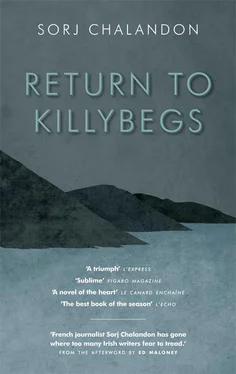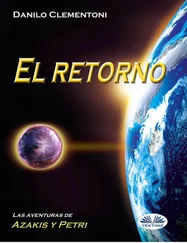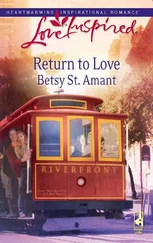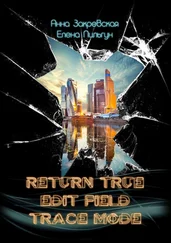— But you and you alone will make use of it, Meehan. There’s no question of him putting anyone else up or transporting anything. He will be your alibi.
— I have no reason to be in Paris for the IRA.
— You’ll find one, Tenor. Your imagination is already legendary.

Antoine arrived in Belfast two days later, on 11 October 1981.
I took him by car to the upper part of the city.
— Do you still want to serve the Irish Republic?
He looked at me. He was astonished. There was laughter in his eyes. Want to? Absolutely! Of course he wanted to! When? Immediately! Whatever I needed of him. I calmed him down with a look. We passed some armoured vehicles. He smiled at the helmeted soldier sticking up out of the open turret, cheek crushed against his rifle butt.
— Pan! Pan! Pan! the wee violin-maker kidded. Rapid fire in French, a good-humoured onomatopoeia uttered through the windscreen.
He would give me the key the next time he came over. No, he’d never ask me anything. Yes, he’d come to meet me at the airport and leave me back there at the end of each trip. It’s a promise, Tyrone. A secret between the two of us, Antoine?
— Not even Jim?
— Just you and me. A mission requiring the utmost trust.
He looked at me, suddenly anxious.
— You’re not going to strike in France?
Never, my wee toy soldier. You don’t spill blood in a country that supports your cause. You love it, you protect it, you respect it. The IRA would never touch your soil. It is sacred to us.
— Alright, son? Will we keep it like that?
We would keep it like that. Of course. If he had been less cramped, he would have taken out his violin to celebrate the great news. Antoine was entering our ranks once more. He was leaving his loveless life for the love of our lives. I felt strange, neither shameful, nor guilty, nor remorseful. I looked at him. I didn’t regret a thing. By using him, I was making amends for his foolhardiness. He would play at war without risk or injury. I was going to protect him. He had his eyes closed, his hands crossed behind his head. He was the picture of happiness. And I was happy for him.

— Pan! Pan! Pan!
Bent over the tape recorder, Waldner jumped. He gave me a questioning look.
— We were passing an armoured car.
He nodded, smiling.
— A real terror, your little Frenchman.
Three months before, they had installed a miniature recording device and microphone in my glove compartment. Every Saturday at the Castle Place post office I would write a postcard on the counter that was always covered in scraps of paper. The tapes were in a closed envelope, sellotaped to the inside of the Belfast Telegraph . Waldner would come in, approach the counter and take the newspaper. Not a word exchanged, not a glance. It was convenient. As if he wasn’t who he was, as if I wasn’t myself.

I became acquainted with Honoré. A little like the way you learn to recognize a French wine. I observed him for a long time before tasting him. He was different to Waldner or the red-haired handler, who had stayed behind in Belfast, with their military questions. When they met me, they were waging war. Honoré, on the other hand, was not a soldier, but rather a student who works hard at his course. And I was the subject of his study.
We met at the Jussieu Campus in Paris. Unlike Belfast, the gates of the institution were not guarded, the stairways were clear and the classrooms often left open. Only once, after violent incidents between students from the left and right, did campus police screen everyone. Honoré asked me for a passport photo to make me a university staff card in case that should happen again, but the guards had disappeared the following day. On fine days, we sat out on the flagstones on chairs borrowed from a classroom. I’d talk, he’d take notes. From a distance we looked like a professor and his student. In the cafeteria, at the back of a deserted amphitheatre or sitting on tables in a deserted space, we looked like the ghosts surrounding us. We would eat sandwiches and drink soft drinks. No alcohol during our talks. He’d asked me that as a favour. So I’d come to the meeting with my flask in my pocket and I’d drink behind the Englishman’s back.
The first time I saw Honoré, he was wearing a civil-servant suit, but in Paris, with me, he preferred jeans, polo-necks and trainers.
To begin with, he asked me unimportant things. I think he was warming up. He wasn’t interested in what the IRA was up to.
— What I want to know is what it’s thinking.
What the IRA was thinking? He wanted to get a picture of who gave the orders within the army, the politicians or the soldiers. If there were dissensions in that respect and who made up the different factions. He asked me questions about Irish current affairs. At the last Sinn Féin Ard Fheis, which public speaker had been wildly applauded by the crowd, and which had practically cleared the room when they took the platform? Why? And what impact did it have on the movement’s strategy? Discussing that kind of thing seemed fairly harmless. But his way of taking notes reminded me who he was. As he wrote, he didn’t stop watching me for a moment. He never lowered his gaze to his notebook. He’d scribble his letters by guesswork, instinctively putting sentences together. Between my eyes and his eyes was the thread, and he was afraid of breaking or losing it. He knew that while I was looking at him, I’d almost forget he was writing. From time to time, Honoré would nod, blink, offer me a sign of understanding. When I hesitated, he’d encourage me with a frown. Two friends chatting, the older seeming to captivate the younger. Never, in all my life, had anyone ever listened to me like that.
It is difficult to write, to say or even to understand, but little by little I came to enjoy these exchanges. My words weren’t killing anyone, making anyone suffer or sending anyone to prison.
— I’m sure you’re going to like Honoré, the handler had told me.
And I had shrugged disinterestedly.
Sometimes I even found him funny.
— You don’t consider that by naming a party ‘Sinn Féin’, Protestants will feel excluded? he asked me one day.
— Excluded?
— Calling yourself ‘We Alone’, yes, that’s going to cause feelings of exclusion!
I smiled.
—‘Ourselves’, Honoré. The words ‘Sinn Féin’ mean ‘ourselves’ in Irish. We will free ourselves by ourselves.
He made a note, pulled a face despite what I’d told him and circled the word in black.
— When I circle a word, it’s to check it, he informed me.
— You circle quite a lot of things.
— That’s true.
The British agent’s main interest was about our real attitude towards an eventual ceasefire. Our newspapers, meetings and demonstrations all called for a lasting peace. He wanted to know if it was a slogan intended for onlookers or an ideology that drove us.
— How can you advocate phrases such as ‘With a ballot paper in one hand and an Armalite in the other’?
So I’d explain, the way a man does to a child. I was patient and we had the time. Yes, the Republican movement was ready to discuss peace, but we needed a strong signal from London. Without this signal, our people would forbid us from laying down our arms.
— Even since the hunger strikes?
I looked him right in the eye. Contact between the IRA and London had never ceased. Never. Even during Bobby’s death throes, even after his death and those of his comrades. There had always been a means of communicating between the two camps. He knew it, I knew it. So why didn’t he quit asking his trick questions.
Читать дальше













